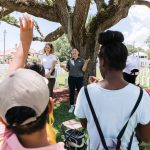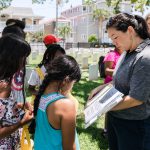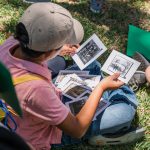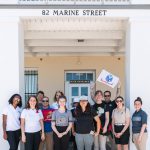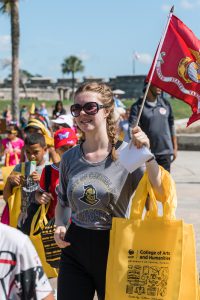
It was Elizabeth Klements’ own family history that inspired her to study history. She grew up hearing stories about her grandparents fleeing Lithuania during World War II, when Soviet troops began to invade the country and set up a communist regime.
“Their stories were an integral part of my childhood, and they showed me a different perspective on the Second World War and the Sovietization of Eastern Europe than what I saw in the classroom,” says Klements, who will graduate with her bachelor’s in history this fall. “They made me realize there’s many hidden perspectives and untold stories to explore and to share.”
During her time at UCF, Klements was active in the UCF History Department. She contributed to the Veterans Legacy Program, which had students create biographies of veterans buried or memorialized at multiple cemeteries across Florida. Her biography was for World War I soldier Paul Hon, who she chose because he’d lived in Deland, Florida like herself. Klements says writing the biography was her favorite project at UCF so far.
“It was so rewarding to piece together details about Paul’s life and his service in the army, while simultaneously learning more about Deland’s history and about World War I in general,” she says. “The project really emphasized the enormous human cost of the war — and that every soldier, like Paul, has a story.”
Since completing that project, Klements has begun her Honors in the Major thesis about different types of prisoners in the GULAG, the Soviet labor camp system. Using information from the biographies of men and women who survived the GULAG, she’s been able to explore how the Soviet prison camps favored and empowered the professional criminals in the camps, making life in the camps even more unbearable for the political prisoners.
“This has been an exciting project because it’s preparing me for the type of research I’ll be doing in graduate school, and it has given me an interesting perspective on life in the Soviet Union, particularly in the Stalinist era,” says Klements.
Her success as a student led her to win the 2019 Founders’ Award for the College of Arts and Humanities. Every year, the dean of each college at UCF selects one undergraduate student to receive the prestigious award, which includes a $500 prize. Klements also received a Dean’s Fellowship and a position as a graduate assistant once she begins her master’s program at UCF this fall. After she graduates, Klements intends to pursue a Ph.D. and become a history professor — a goal she credits her own history professors for motivating her to achieve.
“The history faculty at UCF have been amazing,” she says. “Every class I’ve taken has strengthened my passion for history.”
Klements says she’s most passionate about mid-19th century to mid-20th century European history, a time that she calls a period of social, political and technological change. In fact, she plans to study the intellectual origins of communism for her graduate thesis. And if she could have a conversation with anyone from history, it would have to be Joseph Stalin. “Assuming that he’d be obliged to tell the truth!” she adds. “Stalin was a paranoid, secretive man who left no diary or memoir behind, so historians struggle to find out the motives behind many of his outrageous and deadly decisions for the Soviet Union.”
Dr. Amelia Lyons, who was one of Klements’ professors, says that Klements consistently excelled in her classes. “Elizabeth has an extraordinary blend of intellectual curiosity and a dogged work ethic,” she says. “I’m positive she will excel in our MA program, because Elizabeth will continue to take advantage of every opportunity UCF offers her.”
Visit history.cah.ucf.edu to learn more about the many accomplishments of UCF History students and faculty.
At a recent Veterans Legacy Program Day of Learning event, Klements served as a team leader, guiding fourth graders from Little River Elementary School through various learning and activity stations in St. Augustine.



